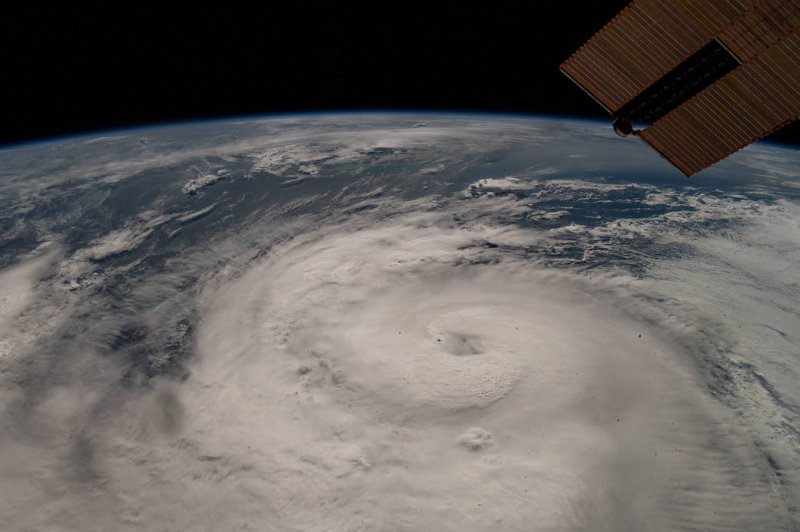
People stop to look at the lowered gates of the Fox Point Hurricane Barrier as Tropical Storm Henri arrives in Providence, R.I., on August 22, 2020. Scientists said climate change led hurricanes and tropical storms to dump more rain during the 2020 season.
File Photo by Matthew Healey/UPI | License Photo
April 12 (UPI) -- Human-caused climate change caused tropical storms and hurricanes to dump up to 10% more rain in 2020 compared to those during the pre-industrial era, a study released Tuesday indicates.
Researchers used what they called "hindcast attribution" -- like a forecast but for the past -- to quantify rainfall associated with storms during the 2020 Atlantic hurricane season. The season, which runs from June 1 to Nov. 30 each year, included 30 named storms, 14 of which were hurricanes.
The record-breaking hurricane season caused about $40 billion in damage worldwide.
"Hurricanes are devastating events, and storms that produce more frequent hourly rain are even more dangerous in producing damage flooding, storm surge and destruction in its path," lead study author Kevin Reed said in a press release.
April 12 (UPI) -- Human-caused climate change caused tropical storms and hurricanes to dump up to 10% more rain in 2020 compared to those during the pre-industrial era, a study released Tuesday indicates.
Researchers used what they called "hindcast attribution" -- like a forecast but for the past -- to quantify rainfall associated with storms during the 2020 Atlantic hurricane season. The season, which runs from June 1 to Nov. 30 each year, included 30 named storms, 14 of which were hurricanes.
The record-breaking hurricane season caused about $40 billion in damage worldwide.
"Hurricanes are devastating events, and storms that produce more frequent hourly rain are even more dangerous in producing damage flooding, storm surge and destruction in its path," lead study author Kevin Reed said in a press release.
"Our findings indicate that environmental changes caused by humans are signaling more and quicker rainfall, which have direct consequences for coastal communities and sometimes outlying areas," said Reed, associate professor and associate dean of research at the School of Marine and Atmospheric Sciences at Stony Brook University.
Reviewing the rainfall rates over 3-hour and three-day timeframes during the storms, the team found that tropical storms had an increase of 10% and 5%, respectively, compared to storms before 1850. For hurricanes, the effect was an 11% and 8% increase.
The team said human activities, including industrial growth, increased greenhouse gases in the atmosphere, leading to a more than 1 degree Celsius increase in the global surface temperature in 2020 compared to 1850.
This has led to a sea surface temperature increase in the North Atlantic basin of between 0.4 degrees to 0.9 degrees.
"An increase in hurricane rainfall due to global warming is not surprising," said study co-author Michael Wehner.
"What is surprising is that the amount of this human-caused increase is so much larger than what is expected from increases in humidity alone. This means that hurricane winds are becoming stronger as well," said Wehner, a senior scientist at the Lawrence Berkeley National Laboratory.
The research team published its findings Tuesday in the journal Nature.
Study: extreme hurricane seasons made twice as likely by ocean warming

A new study from Berlin-based Climate Analytics says extreme hurricane seasons have been made twice as likely by global warming of the oceans. Photo by Mark Garcia/NASA
April 13 (UPI) -- Exceptionally intense Atlantic tropical hurricane seasons are twice as likely as they were in the 1980's due to global warming, according to a new study by Berlin-based Climate Analytics.
The research, published Wednesday in the journal Weather Climate Dynamics, found that for the year 2020 extreme Atlantic hurricane seasons were made twice as likely by ocean warming.
"While the attribution of individual tropical cyclone events remains difficult, there can be no doubt that climate change is creating more intense storms," study author Peter Pfleiderer said in a press release.
The researchers found, using a novel weather-pattern-based statistical model, that a "forced warming trend" in Atlantic sea surface temperature, or SST, increases from 1982-2020 doubled the probably of "extremely active tropical cyclone seasons."
Human-caused climate change caused tropical storms and hurricanes to dump up to 10% more rain in 2020 compared to those during the pre-industrial era, according to a separate study released Tuesday.
The new study said, "There is increasing consensus in the scientific literature that the number of tropical cyclones might not or only moderately increase, while the number of most intense storms would increase substantially."
The research shows that Atlantic tropical cyclone activity has increased and that increase "can be robustly ascribed to variations in atmospheric circulation as well as sea surface temperature increase."
"Our findings indicate that warming SSTs over the tropical Atlantic might have already contributed significantly to more extreme tropical cyclone seasons and thereby to the fatalities, destruction and trillion dollar losses that these cyclones have caused over the last four decades," the study concluded.
The study said to minimize future risks, "stringent emission reductions in line with achieving the goals of the Paris Agreement would be required."
"Our results do not imply that increasing sea-surface temperatures lead to more tropical cyclones -- but point toward a trend of more intense storms and therefore more extreme outcomes for seasons with many tropical cyclone," Pfleiderer said.
No comments:
Post a Comment